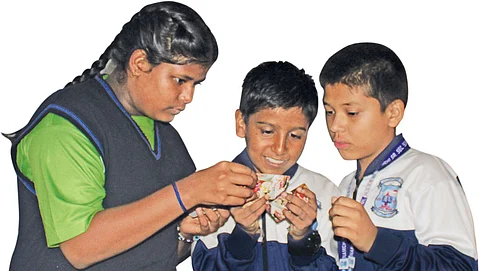

Teaching climate change to young students is always a challenge. It is often associated with disasters and catastrophes, which can overwhelm children, says K S Rai, a geography teacher at the Government Senior Secondary School in Namchi city of Sikkim. “When I discussed environmental degradation, I often felt that my students did not fully grasp the urgency of the issue,” he recalls.
Climate change is just one sub-topic of a chapter in the NCERT (National Council of Educational Research and Training)’s geography book for class 8. But Rai wanted his students to not just learn about the subject, but also meaningfully engage with it. In early 2023, he introduced a novel teaching tool: a card game designed to explain climate change concepts in an interactive way.
The idea for the game came unexpectedly. In November 2022, Rai arrived late to his classroom and found students engrossed in a round of UNO cards. “Though I reprimanded them for playing cards in class, seeing their excitement over a card game left an impression on me,” he says. Over the next few months, he developed a set of playing cards focused on climate change.
The game involves 28 cards, split into two questions and answers. Each card is related to a climate change topic. For example, one card asks, “What is climate change?” and its corresponding card answers, “Shifts in temperatures and weather patterns.” Another question asks, “What can we do at school level and at our home to cut the emissions?”, with the answer being, “Switch off the energy appliances such as refrigerator, air conditions, fans etc. When not required do not burn waste such as plastics and papers rather reuse or recycle.” The students must match the cards correctly to form a pair.
“The game’s basic rules are similar to the popular card game poker,” says Rai. Students are divided into four groups. The teacher shuffles and deals three cards to each group, with the remaining placed in the centre. The goal is to create two matching pairs and one set of three related cards. The first group begins by examining their cards. If they can form a matching pair, they pick an additional card from the deck. If not, they discard a card, which becomes available for other groups. The group that first creates the correct sequence of seven cards, wins.
For Rai, this game has been transformative in helping students internalise complex environmental issues. “They are no longer just memorising definitions,” he says. In 2024, he showcased the game at a teacher training workshop organised by the Green Schools Programme of the Delhi-based non-profit Centre for Science and Environment. “The event had schoolteachers from across India, and many showed interest in using the cards,” says Rai.
This was originally published in the 1-15 October, 2024 print edition of Down To Earth